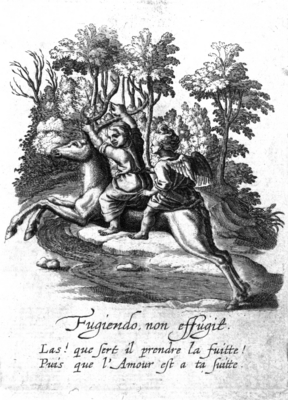Assiduitas Amoris [27]

XXVII.
Propert.
Quo fugis? ah demens! nulla est fuga, tu licet vsque
Ad Tanaim fugias, vsque sequetur Amor.
Non si Pegaseo vecteris in aëra dorso,
Nec tibi Persei mouerit ala pedes.
Vel si te sectæ rapiant talaribus auræ,
Nil tibi Mercuri proderit alta via:
Instat semper Amor, supra caput, instat amanti,
Et grauis ipse super libera colla sedet.
Excubat ille acer custos, & tollere numquam
Te patietur humo lumina capta semel.
Propert.
Quo fugis? ah demens! nulla est fuga, tu licet vsque
Ad Tanaim fugias, vsque sequetur Amor.
Non si Pegaseo vecteris in aëra dorso,
Nec tibi Persei mouerit ala pedes.
Vel si te sectæ rapiant talaribus auræ,
Nil tibi Mercuri proderit alta via:
Instat semper Amor, supra caput, instat amanti,
Et grauis ipse super libera colla sedet.
Excubat ille acer custos, & tollere numquam
Te patietur humo lumina capta semel.

Senec.
AVdi Senecam; nec peregrinatione longâ, nec
locorum varietatibus, Amorem; aut tristitiam
mentis, grauitatemqueue discuties: animum debes
mutare non cœlum. licet enim vastum traieceris
mare, sequentur te, quocumque perueneris, vitia.
quid miraris, nihil tibi peregrinationes, nihil fu-
gam prodesse, cum te circumferas? motu ipso no-
ces; ægrum enim concutis.
AVdi Senecam; nec peregrinatione longâ, nec
locorum varietatibus, Amorem; aut tristitiam
mentis, grauitatemqueue discuties: animum debes
mutare non cœlum. licet enim vastum traieceris
mare, sequentur te, quocumque perueneris, vitia.
quid miraris, nihil tibi peregrinationes, nihil fu-
gam prodesse, cum te circumferas? motu ipso no-
ces; ægrum enim concutis.

Assiduitéde l'Amour.
XXVII.
Pour eschapper l'Amour que sert il courir víte?
Ses traits, ses feux, ses dards persone les euite:
Touts les temps, touts les lieux, viueut soubs ceste loy,
Que qui vit sans Amour, il vit comme vne beste.
Arreste doncq le cours, ame volage, arreste,
Car esloigner l'Amour, cest s'esloigner de soy.
XXVII.
Pour eschapper l'Amour que sert il courir víte?
Ses traits, ses feux, ses dards persone les euite:
Touts les temps, touts les lieux, viueut soubs ceste loy,
Que qui vit sans Amour, il vit comme vne beste.
Arreste doncq le cours, ame volage, arreste,
Car esloigner l'Amour, cest s'esloigner de soy.
Translations
 |
Love goes on and on. |
 |
Where are you fleeing to, you madman! You cannot get away anywhere: although you1 Run off as far as Tanais, Love will follow you just as far as that. Not if you ride on Pegasus' back in the air2, Nor if the wing of Perseus moves your feet3, Or if the severed winds rush you off on winged sandals, Mercurius' high road will be no good to you. Always Love looms above your head, it looms over the lover, And with all its weight it sits on top of the neck that was free. He holds watch sharply and will never let you Raise your eyes from the ground, once they have been caught. |
 |
By fleeing the lover does not change his heart, only where he lives. Where are you fleeing to? Woe, all the time you run away,
Love will go with you. |
 |
By fleeing he does not escape. |
Literature
Sources and parallels
-
Same copperplate, slightly altered, in: De liefde is niet te ontvlugten [8] (in: Willem den Elger, Zinne-beelden der liefde (1703))
[Compare
![Compare [compare]](/static/images/compare2.gif) ]
]
-
Porteman 1975, p. 212. Same Latin motto as title under the pictura, in: Fugiendo, non effugit. [15] (in: Jacob Cats, Sinne- en minnebeelden (1627))
[Compare
![Compare [compare]](/static/images/compare2.gif) ]
]
References, across this site, to this page:
- Fugiendo, non effugit. [15] (in: Jacob Cats, Sinne- en minnebeelden (1627))
- De liefde is niet te ontvlugten [8] (in: Willem den Elger, Zinne-beelden der liefde (1703))
- Mes pleurs mon feu decelent [3] (in: Daniël Heinsius, Emblemata amatoria (1607/8))
Iconclass
Love and a girl are riding a running stag- hoofed animals: stag (+ running animal)
[25F24(STAG)(+5212)]

- forest, wood
[25H15]

- adolescent, young woman, maiden
[31D13]

- flight, running away; pursuing
[33B9]

- riding on animal other than horse, ass, or mule (+ two persons ~ traffic and transport)
[46C132(+22)]

- Necessity, Inevitability; 'Necessité' (Ripa) (+ emblematical representation of concept)
[51C2(+4)]

- (personifications and symbolic representations of) Love; 'Amore (secondo Seneca)' (Ripa) (+ clothed with wings)
[56F2(+1331)]

- (personifications and symbolic representations of) Love; 'Amore (secondo Seneca)' (Ripa) (+ emblematical representation of
concept)
[56F2(+4)]

- proverbs, sayings, etc. (with TEXT)
[86(ASSIDUITAS AMORIS)]

Comments
commentaryNotes
Prop. II, 30, 2, ll. 1-10.
Teubner ed. has "in aere dorso"; "aera" is wrong: in aere means "in the air", "aloft" (Butler in Loeb ed.). It may be remotely
possible to interpret 'aera' in "in aera" as a Greek acc. (of aer), but probably not.
Teubner ed. has "Nec tibi si Persei"; 'si' is missing; it should be 'Nec tibi si Persei mouerit ala pedes'. Oddly enough the
defective line will scan as a pentameter too.
![[H O M E : Emblem Project Utrecht]](/static/images/rd-small.gif)




































































































